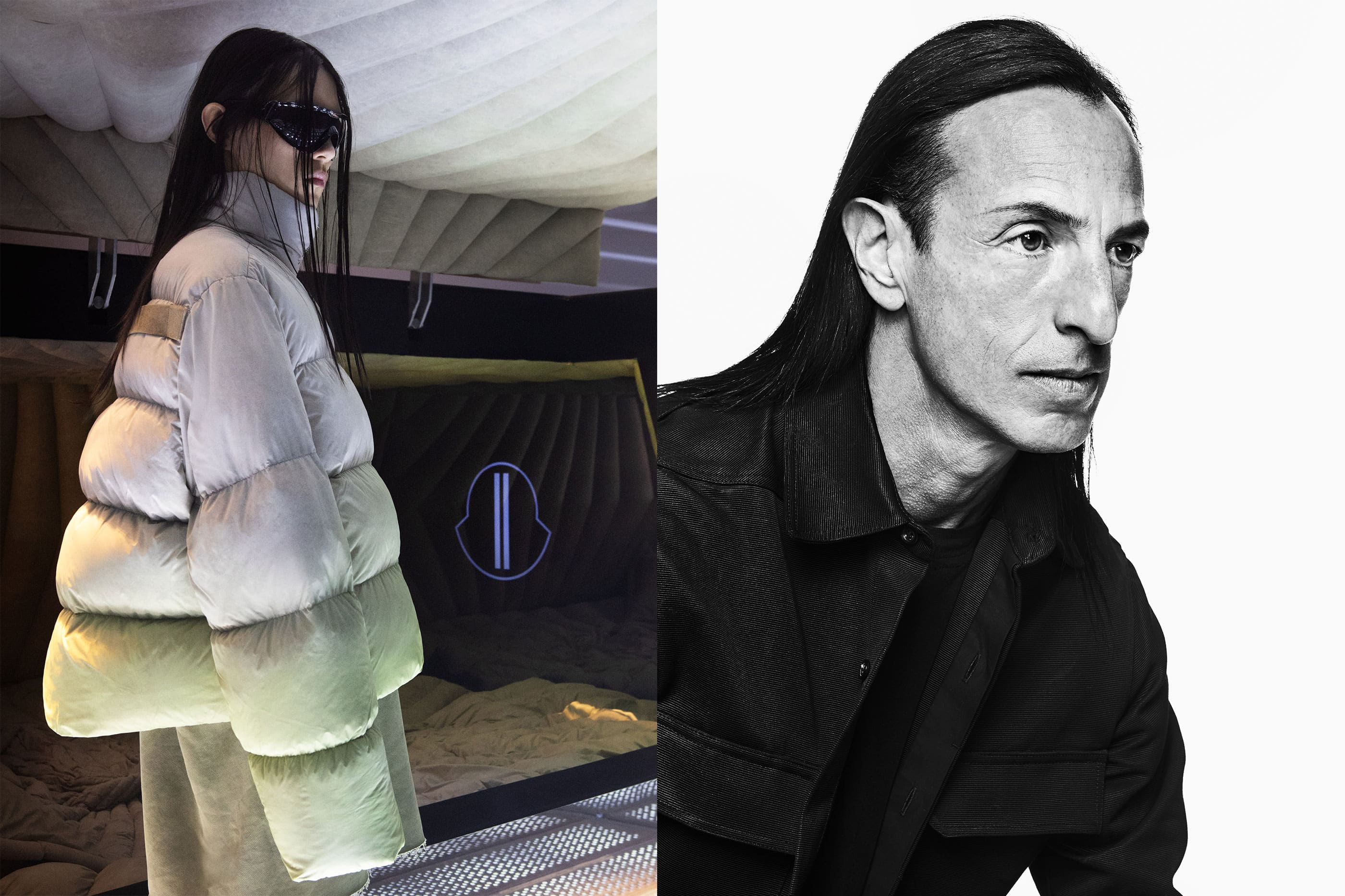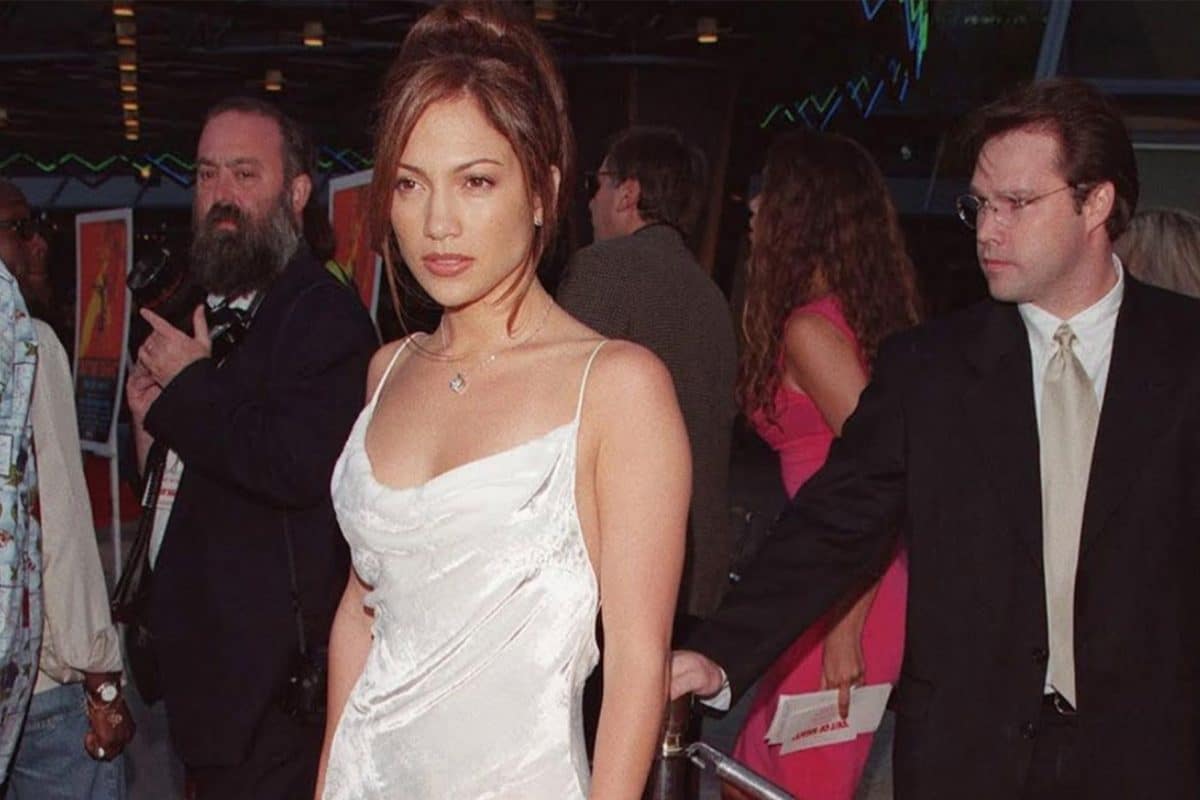
In an industry dominated by eccentric personalities and performative stunts of fashion its exciting and intriguing that a designer like Rick Owens still manages to so effortlessly stand apart from the crowd.
The California-born, Paris-based designer and his eponymous fashion label have cultivated a distinctive and authentic aesthetic. Owens' signature gothic, oversized silhouettes and colour schemes have become hallmarks of his style, straying from ideas of trend or pandering to the masses.
As part of the designer's second collaborative collection with Italian luxury fashion House Moncler, Owens created a steel, soundproof Sleep Pod, complete with regenerative oxygen and temperature-controlled ventilation system. The accompanying collection features solemn, elongated silhouettes on a reduced palette of black, dirt and degrading neutrals.
In an in conversation between the two brands and the lead up to the new collection's release, Owens discusses his design ethos, inspirations, his stance on AI and new collection with Moncler.
You used to be shy, but now you’ve fulfilled such an eccentric and cool life. Could you tell us when you’re not afraid of what others think of you anymore? What about you, when you were young any icon who inspired you like this?
I always remember seeing David Bowie’s Diamond Dogs album cover in a record store in the little conservative town I was raised in when I was around 13 years old. It validated the weirdness and alienation I felt, and made me know there was a place in the world for me. I am no comparison to Bowie, but I hope I have helped others in a similar way.
As a designer and a brand leader, how do you lead the entire team, and how do you listen to the ideas of the younger generation?
I don’t think I am such a great listener. I don’t have a design room of people suggesting things. I pretty much know exactly what I want and I am just looking for the best way to get my ideas executed. I need efficient technicians more than I need ideas... that being said, I have been lucky enough to end up with a group of wildly creative colleagues that inspire me every day and fill my life with such gratitude and quiet, gentle joy.
What qualities does a person possess that would attract you to have them join the Rick Owens team?
I love having people around me that have the patience to see things through in a careful and precise way, allowing me to be reckless and impractical. But I do need windows into other worlds that I don’t necessarily want to completely immerse myself in. I love having explorers that come back with their exotic reports.
Thom Browne's team is renowned for wearing their own suit uniforms, and he mentions, "To make sure employees always know why they are working." On the other hand, the Rick Owens team always naturally dresses like a family. Do you have any secret and undisclosed rules or commonalities within your team?
No rules and no limits. I always wanted to spread a message of inclusion and embracing otherness. The irony is that our otherness can seem forbidding to some, and make them feel unwelcome.I need to work on ensuring that doesn’t happen.
Do you think of yourself as an icon, whom young people follow?
I think I have positive values that I endorse in a soft way. I could be a lot worse.
Which brand or designer in fashion would you be most upset to see leave the industry?
Rei Kawakubo balances out an industry that can be very conservative. We need a voice like hers to remind us what’s possible.
If you could find a designer partner to work together – just like Miuccia Prada and Raf Simons – who would be your most ideal partner? And, which fashion House would you like to work in?
I never learned how to be part of a team and negotiate. I would just automatically become polite and concede to anything, rather than contest it. For better or for worse, I am a loner and have learned to accept that instead of forcing myself to be something I am not.
Daniel Roseberry once said in a recent interview about Paris Fashion Week, “Fashion shows are getting more and more stuff, but the touches of heart are getting less and less.” Do you agree? What are your thoughts about fashion shows nowadays?
I think every fashion show is valid in its own way. Sometimes the cynical calculations of fashion are just as thrilling as the most authentic creative gestures. I find a way to enjoy everything, perverse or genuine.
I would like to know about your experience visiting Michael Heizer's land art pieces. Have there been any recent artworks or artists that have deeply inspired you?
I just saw a Donal Judd show that made me fall in love all over again. I am afraid I only like dead artists that have maintained a consistent level until the end. I can’t invest emotionally in someone whose quality of output isn’t guaranteed.
When you experience significant inspiration, do you prefer to share it with others immediately or process it on your own? What is your usual method for recording or documenting these emotions and inspirations?
I don’t fall in love very easily. I have few commitments, but they are deep and long. And while my life is an open book, I keep a lot to myself.
A fashion designer and a rock n’ roll star: you and Iggy Pop. What are the similarities and differences between you both?
I am his humble inferior.
What is the inspiration behind the latest Moncler + Rick Owens collection?
I always consider my personal needs and desires – I selfishly focus on what I would want to see and try to provide that.
How did you come up with the idea of sleep pod?
I had been considering an apartment in New York and, realising I wouldn't be able to control the calm and quiet I have in Paris, I thought I would guarantee it by creating a soundproof retreat for myself. Kind of like Christ's stone tomb or Sleeping Beauty's glass coffin. I was going to make it for myself anyway, but when Moncler suggested a collab, I thought I would build a collection around it.
What is your favourite piece of clothing or accessory in the collection? What makes it special?
I love the radiance jacket that has the volume of 1950s couture, with the modern responsible consciousness of environmentally friendly fabrications and the organic quilted softness of a gentle druid.
The collection incorporates your iconic slim and oversized silhouette. How did your fascination with this silhouette form?
I intend to come back as a Brancusi sculpture in my next life. Thinking of Brancusi in everything I create is a start.
Your brand is characterised by the predominance of black, but surprisingly there are some brighter gradient colours in this collection. Why is there such a change in the choice of colours? You've mentioned that you like black because it hides insecurities, so does the utilisation of bright colours indicate the decrease in insecurities?
I don't know where that quote came from, because it couldn't be more opposite. Although, I suppose black can hide insecurities for some of us. I appreciate wearing black for observing a little formality and quiet modesty – the world is a very colourful and cluttered space. Wearing black and providing a respite for the eye can be a polite gesture.
The collection is not the first time you have collaborated with Moncler. What leads to continual collaboration?
My job is to invent and I love it. Moncler loves sponsoring and celebrating creativity, so they are a great match. And as for working together repeatedly, I think the fashion world could use a bit of loyalty.
You once mentioned in an interview that you used to resist co-branding, worrying that it would muddy your identity, and it was only when you realised you had established an identity in the fashion industry that you started to welcome co-branding. Can you expand on what made you realise that you had established an identity? And what kind of identity is it?
I am probably recognised for a dark and bombastic ethos, but I hope I also represent embracing otherness and suggesting aesthetic options that don't conform to the very narrow standards of beauty in our contemporary culture.
Glunge is a distinctive label for Rick Owens. How do you understand the term Glunge? Nowadays, many major fashion houses iterate their style by changing creative directors in order to satisfy the ever-changing preferences of consumers. Have you ever thought about making some changes to the style of Rick Owens?
I think I invented that word, although others have used it. Glamour and grunge – I always appreciated a very earthy, creative expression. For instance, Joseph Beuys as opposed to Boldini. I am flattered to be compared to major fashion houses, but they need to appeal to a much broader spectrum than I have to.
Eugene Rabkin once wrote the raw and twisted seams, the unfinished hems, and the earthy colours emphasise Rick Owens’ desire to reflect a world that is imperfect. Is AN "imperfect world" the message that you want to convey? What does it imply?
It implies acknowledgement of our shared realities of life, and empathy for the human condition. But, I don't insist on that being the only option – joyful Disneyland escapism has just as much validity for some.
With the rise of AI, the fashion industry is undergoing a transformation in the way products are designed. What is your stance in AI?
It is ominous, creepy and inevitable. All of my favourite things.
What is your biggest ambition or goal at this stage?
To get weirder, smarter, kinder.



